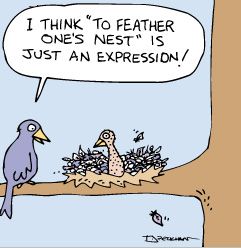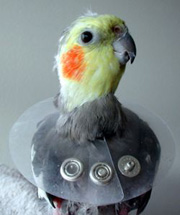Feather Plucking
There can be many reasons why a bird plucks his/her feathers. Some common causes are:
- Vitamin A and other dietary deficiencies
- Chronic exposure to tobacco smoke or cleaning products
- Chronic liver, kidney, GI, or respiratory disease
- Feather cysts or tumors
- Bacterial or fungal infections
- Virus and parasites
If your bird is plucking, it must be seen by a qualified avian vet immediately!
Q. Why is my bird plucking or losing its feathers?
A. There could be many reasons why a bird might be plucking or losing his/her feathers, listed below are some of them.
• Polyoma and psittacine beak and feather disease may result in feather loss.
• Parasites like scaly-face-mites, red mites, feather mites or lice can cause irritation. 
• Spraying your bird with lice and mite spray has been proven to cause feather plucking.
• Giardia is a protozoan parasite and can cause self mutilation.
• Bacterial and fungal infections may cause skin irritation resulting in feather loss.
• Vitamin A and other dietary deficiencies can contribute to skin/feather disorders.
• Behavioral causes like self mutilation could be caused by dominance factors, boredom, territoriality and mate-bonding. All of these factors can result in frustration-grooming, which often becomes obsessive, turning into a vice, causing self mutilation and feather damage or removal.
• Attack by cage mates or other pets (cat, dog or rodents).
• Skin irritation could be cage trauma, insect bites or stings, topical application of inappropriate ointments or improper wing trim.
• Chronic exposure to tobacco smoke, cleaning products or toxic substrates.
• Chronic liver, kidney, GI, respiratory disease, feather cysts, tumors and injury may also result in feather loss.
If your bird is plucking or losing its feathers, it must be seen by an avian vet immediately. It will be up to the avian vet with diagnostic tools and the bird owner, with information on environment and history to put together these clues and find a cause and or remedy.
Q. My female is plucking, does she need a mate?
A. You need to take your female Cockatiel in to see an experienced avian veterinarian for a check up to 
address the plucking. Contrary to popular belief, it is very unlikely that your Cockatiel is simply plucking due to stress or loneliness. Plucking is actually most often related to an actual medical problem which may require treatment. Plucking can be related to things such as bacterial infections, heavy metal toxicity, nutritional deficiencies, fungal infections, viruses and hormonal problems. Plucking is often just a symptom of another problem. Mickaboo has had a lot of birds who have been pluckers and have been diagnosed with one of the above problems. Once we treated the underlying problem, the birds usually stop plucking. If your birds have an infection, for example, adding new birds to the "flock" without treating the resident ones will be putting the new birds at risk.
The good news is, if your birds are plucking due to a health problem, there is a chance your birds will stop plucking once the health problem is resolved. The plucking can actually be a good thing if it alerts the owner to a health problem before it gets really severe so it can be resolved before getting out of control. If your birds were allowed to pluck for a long period of time before addressing the health problem, however, the plucking can become a habit (like nail biting in people) and continue beyond the resolution of the health problem.
If your females are plucking due to hormonal problems, it is unlikely that just pairing them up with a male will solve the plucking. This is something best discussed with your vet as there are treatment alternatives if hormonal plucking is diagnosed. Giving your female tiel a companion may be a good idea for her in terms of companionship, however, it shouldn't be done with the goal in mind of stopping the plucking. Not only could the plucking continue, but it may get worse and/or she may begin plucking the new bird. We have seen this happen. If your bird has a bacterial infection, for example, and is treated, not only will you have a healthier bird, but you may have a fully feathered one, too ![]() Please consider a thorough health check before adding any new birds to your home.
Please consider a thorough health check before adding any new birds to your home.
